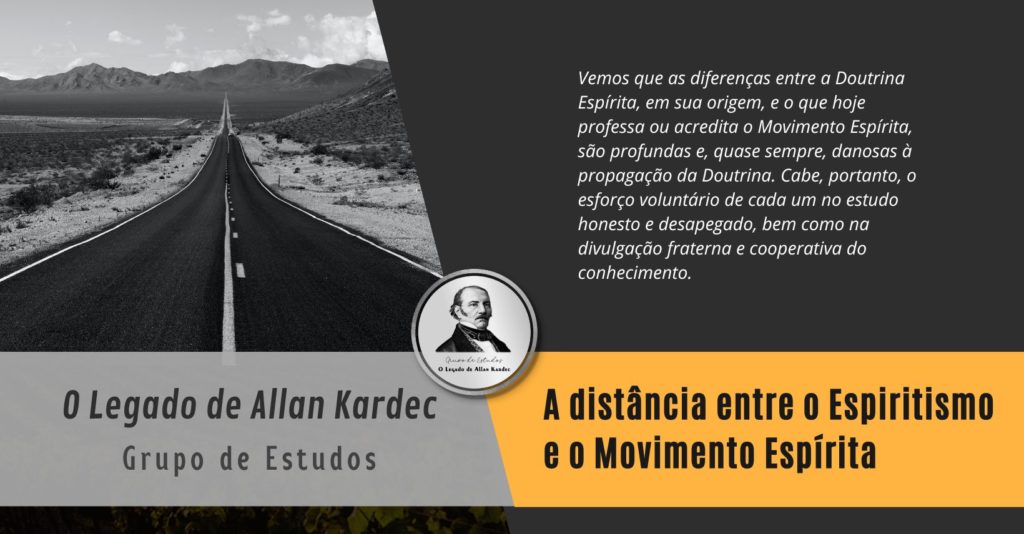Translations, from Portuguese, are automatic. If you notice any errors in the text, help us identify them, clicking here.
Subscribe to our Newsletters and receive our articles directly in your email.
A correspondent asked about what would be this supposed distance, always affirmed by us, between the Spiritist Doctrine and the Spiritist Movement.
To her, we can answer in this way, to exemplify for everyone:
“B…, this is something that everyone needs to really study or seek information, especially about the works cited1 , because understanding and, from there, assuming a new position, needs to be a autonomous action. However, I can highlight some key differences between the Spiritist Doctrine (DE) and the current Spiritist Movement (SM):
- Evocations of the spirits: DE was formed on them and demonstrated the need to be carried out, with method, to continue their development; ME recommends not doing it, provoking a wave of mediums who are only “available”, therefore, without control or learning objective.
- Generality of teaching: DE demonstrated the need to develop the spiritist study through the method of double control: universality and agreement of teaching and rational judgment; ME, infected by Roustaing, who saw a danger in this method (which would disprove her theories), started to take isolated communications as an expression of the truth, without reasoning.
- Life of the Spirit in Erraticity: DE demonstrated that emotions and physical sensations only exist for the attached Spirit; ME began to teach a fully materialized spiritual world, thus creating ideas of attachment harmful to the Spirit who disincarnates.
- Necessity of the incarnation: DE demonstrated that the incarnation is a necessity for the progress of the Spirit, in which he, even if involuntarily, plays his solidary role in creation. He removed the concepts of punishment and punishment as an arbitrary action of God, demonstrating that everything is the fruit of the conscious Spirit's choice; ME, under Roustainguist influence, inserted the false concepts of karma, redemption, law of action and reaction and law of return.
- Heteronomy x autonomy: DE demonstrated, throughout it, that the Spirit develops autonomously, being the first, if not the only, author of its choices; ME, influenced by Roustaing, started to deal with life in a heteronomous way – if I suffer, it is because I am receiving the return; if I have joy it is because I have been blessed, &c.
- Charity: DE demonstrated that charity is a disinterested action, fruit of the Spirit's duty, which consciously moves towards the good; ME started to treat charity as an external action, almost always only material. Due to the absence of DE studies, ME fails to do the good it could to help in the development of society through spiritist ideas.
- Moral: DE demonstrated that, all created simple and ignorant, the Spirits develop wrong and right, through the incarnations, choosing between acting in this or that way. There is no duality between good and evil. Some choose to repeat the mistake, developing imperfections from which they will be very difficult to get rid of, through reincarnation work, in a conscious and autonomous action; ME, influenced by Roustaing, started to treat the incarnation as a punishment, as if all the spirits that incarnate were imperfect.
- Method: DE has always demonstrated the way it would develop itself: through the study of human sciences, confronted, by reason, with the spiritist teachings, in the exchange of information with reputable groups spread all over the world; On the other hand, the ME practically does not study the fundamentals of DE, it has isolated itself in the centers in routines that include: monologues, almost always filled with all the errors mentioned above; passes, without knowledge of magnetism; and mediumistic sessions that, without method and without studies, lose the purpose and usefulness they could really have.
And so on.”
We see that the differences between the Spiritist Doctrine, in its origin, and what the Spiritist Movement professes or believes today, are profound and, almost always, harmful to the propagation of the Doctrine. Therefore, it is up to the voluntary effort of each one in honest and detached study, as well as in the fraternal and cooperative dissemination of knowledge.
Complementing the cited works, we cannot fail to point out the need to study the Spiritist Magazine, which demonstrates how the formation of the Spiritist Doctrine took place.
Reading Recommendations (Books)
- Free PDFs by Kardec – https://bit.ly/3sXXBxk
- Autonomy – The Untold History of Spiritism: https://amzn.to/3PIvbyy
- Allan Kardec's Legacy: https://amzn.to/3RIn2gv
- Final point – the reunion with spiritualism with Allan Kardec: https://amzn.to/48PLaE7
- Neither Heaven nor Hell – The Laws of the Soul According to Spiritism: https://amzn.to/3F2voYO
- Genesis – Miracles and Predictions According to Spiritism (unadulterated): Free PDF or https://amzn.to/3RM91hF
- Heaven and Hell: Or divine justice according to Spiritism (unadulterated): Free PDF or https://amzn.to/3ZGrcal
- Spiritist Revolution. Allan Kardec's forgotten theory: https://amzn.to/3t7HIUH
- Mesmer. The denied science of animal magnetism: https://amzn.to/3PYc1X2
- The Book of Mediums: https://amzn.to/3PDNTHK
- The Spirits' Book: https://amzn.to/3QkcFx9
- Spiritist Magazine – complete collection: https://amzn.to/48Uxh7s
- Practical Instructions on Spiritist Manifestations: https://amzn.to/3QiR8Gc
- Spiritism in its Simplest Expression: https://amzn.to/3M6fXT5
-
- In the sense of doctrinal changes: The Legacy of Allan Kardec, by Simoni Privato; Neither Heaven Nor Hell, by Paulo Henrique de Figueiredo; Final Point, by Wilson Garcia
- In the sense of knowledge about the doctrinal context: Autonomy: the never-told story of Spiritism, by Paulo Henrique de Figueiredo;
- In the real understanding of the Doctrine, in the essence proposed by Kardec, through the studies: O Céu e o Inferno and A Genesis, both from the FEAL publisher, as the others are still adulterated versions. [↩]


